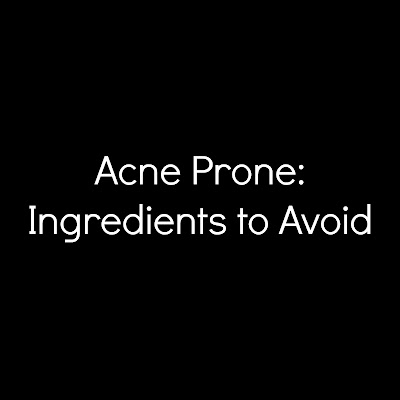Acne Prone | Ingredients to Avoid
 |
| Acne Prone | Ingredients to Avoid |
I have comprised a list of ingredients to avoid in your beauty products if you struggle with acne prone skin. As everyone's skin behaves and reacts differently, not everything I listed here is guaranteed to not cause acne, but is geared as a general rule of thumb.
Let's get in to the list!
Bismuth Oxychloride
That being said, due to it's unique chemical composition, the particles have been known to get stuck in the skin's pores and irritate the skin, which leads to itchiness, and some people, acne. On myself, Bismuth Oxychloride resulted in severe cystic acne.
Have you ever wondered why the bareMinerals Original Loose Powder Foundation made your skin itch!? Bismuth Oxychloride.
This ingredient is found in numerous face powders, bronzers, blush, lipstick, pretty much everything. So just make sure to read the ingredients and look out for the chemical name of Bismuth Oxychloride, (CI 77163).
Dimethicone
Dimethicone creates that slippery feeling to most liquid makeup products.
As it's designed to act as a physical barrier between your skin and your makeup, the dimethicone is actually trapping all of the oils, bacteria, and impurities underneath it, which can result in clogged pores, which we all know can result in acne. I highly recommend avoiding dimethicone based primers all-together.
Coconut
As most acne prone skin types are oily, this is why Coconut is on this list. However, if you suffer from acne but have dry skin, you can skip this. The coconut will actually benefit your skin type.
Without going too in-depth with the science. When you have oily skin, your skin is low in linoleic acid and high in oleic acid, which results in our skin's natural sebum being thick and ends up clogging our pores. To counteract the imbalance, it is recommended that we use oils that are high in linoleic acid. With that in mind, Coconut Oil is somewhat high in oleic acid, not the acid that oily skin types need any more of.
Rosehip and Grape Seed Oil are high in linoleic acid, and are much better alternatives than Coconut Oil for oily skin types.
Talc
However, Talc can be found to clog the pores in our skin. I cannot stress how easily pores can become clogged for oily skin types. Cleansing the skin is essential, and exfoliating the skin once or twice a week is also a must to avoid having pores become to congested with the skin's natural sebum.
If you're having a hard time finding face products without talc, Physicians Formula makes an entire line dedicated to talc-free products, the Mineral Wear Line.
Mineral Oil
Similar to Dimethicone, which is also used for it's moisturizing properties, Mineral Oil acts as a physical barrier to help the skin retain it's moisture. As I stated above with Dimethicone, this physical barrier traps oils, bacteria, and imperfections that is underneath it, resulting in clogged pores and acne.
Mineral Oil is often found in creams, foundations, like the Laura Geller Baked Liquid Radiance Foundation, and other products designed to keep moisture on your skin.
While this filler acts as a moisturizing agent, the negative aspects of this ingredient out way the positive. Natural oils such as Rosehip, Hemp Seed, and Grape Seed offer the same moisturizing benefits, without the pore clogging side effects.
When choosing your skincare, makeup, and beauty products, ALWAYS look at the ingredients.
If you struggle with acne, look for ingredients like the ones listed above that are likely to clog pores. We all have them, but when you're acne prone, yours are more likely to be clogged easily.
Read the ingredients, I cannot stress that enough. It will help reduce your chances of breakouts, and in the long run will be more beneficial for your skin.





Comments